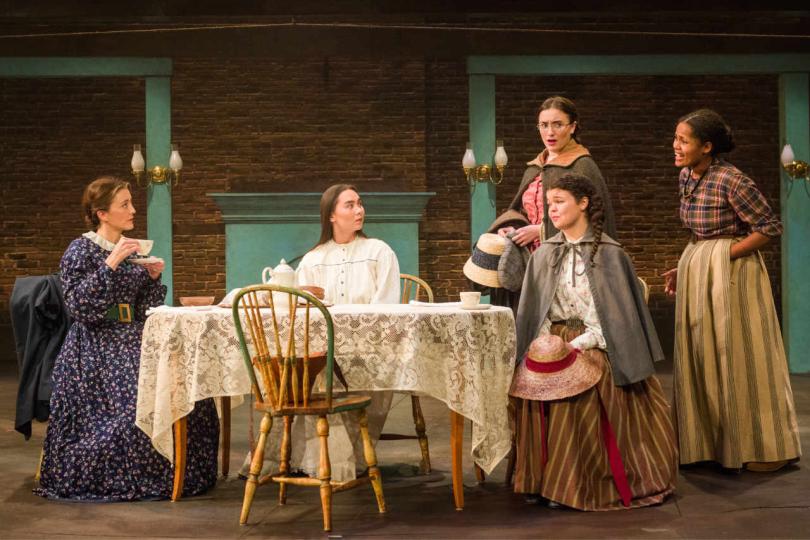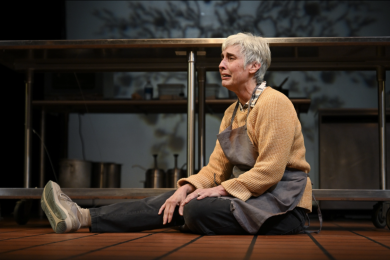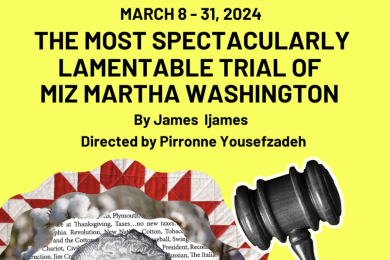The Women’s March on Concord

In Democracy in America, Alexis de Tocqueville wrote that in Europe women “almost consider it as a privilege that they are entitled to show themselves futile, feeble, and timid. The women of America claim no such privileges.” No heroine in popular 19th century American fiction seems to instantiate this observation so much as Louisa May Alcott’s Jo March. Perhaps one of the reasons that generations of American readers have identified with Jo may be is that she embodies the American traits of rugged individualism, self-reliance, and the faith that one might shape one’s own destiny. Little Women belongs to a convention of “women’s rights novels” of the early to mid-1800’s, some of which imagined feminist utopias.
Late in Kate Hamill’s adaptation of Little Women, Amy March accuses her sister Jo of being a “purist.” I don’t recall that exchange from the novel, but it is not a short book. In any event, Alcott purists should probably heed Amy’s criticism. The Press Release for this production informs us that this adaptation “stay[s] true to the spirit of the popular novel.” In other words, audiences should not expect perfect fidelity to the text. If you can let that expectation go, you’ll probably very much enjoy this show. (If not, maybe the thing to do is just to stay home and reread the novel.)
Little Women was originally published in two volumes. Hamill preserves the book’s setting, a house in a rural New England town during the Civil War, as well as most, if not all, of the crucial features of plot up to about the middle of volume 2. She also preserves the distinguishing traits of the main characters, March sisters Jo, Meg, Beth, and Amy.
Unsurprisingly, Director Sarah Rasmussen casts the play perfectly. C. Michael Menge beautifully captures Jo’s playful, rebellious nature, and Megan Burns is terrific as pouty, self-centered Amy. Christian Weber portrays Meg’s transition from vain flirt to mature and responsible spouse and parent with tremendous finesse, and Isabella Star LaBlanc is sweet and ethereal as frail Beth. The standout in the supporting cast is James Rodríguez, who brings to Meg’s suitor, Mr. Brooks, quiet passion and fierce dignity. His awkward, embarrassed courtship of awkward, embarrassed Meg is charming, and the two actors have a lovely chemistry. We root for their happiness.
Hamill clearly wants to call attention to those ways in which Alcott’s work of the late 1860’s speaks to our condition in the late 2010’s, and for the most part she succeeds. In some cases, Hamill’s modernizing is just a matter of bringing out features or themes that were already present just below the surface of the novel. One example is the gender non-conformity of Jo and her next-door neighbor and bestie, Theodore Lawrence, or “Laurie,” as he prefers to be called (Michael Hanna). Hamill makes the two characters’ resistance to traditional gender roles the source and foundation of their friendship; their bond becomes a space in which they can embrace and take pleasure in the freedom from gender constraints. When they are with each other, Jo can be the boy she longs to be, and Laurie can bend to the feminine. Menge and Hanna bring a lot of joy and buoyant humor – as well as pathos - to their scenes together. One particularly lovely moment occurs at a ball, where Jo insists on leading Laurie as they dance. Later in the play, Hamill hints that Jo may be queer.
The loving relationship between willful, outspoken Jo and shy, delicate Beth is also beautifully rendered, and Hamill depicts Beth’s decline without the slightest sentimentality. The warmth between Marmee (Christina Baldwin) and her daughters feels genuine, and the melodramatic theatricals that Jo produces with Amy, Meg and Laurie -- with Beth on an out of tune piano – are hysterical.
It is refreshing to see the (much discussed) topic of Jo and Laurie’s gender fluidity finally take center stage, so to speak. At the same time, however, occasionally Hamill’s efforts to heighten topicality or political relevance feel a little artificial. Hamill models Jo as a high-minded, impassioned progressive, and when she is expressing her feminist convictions or her resistance to rigid social conventions, that works well. It is less effective when she tries to make Jo a spokesperson of the resistance. While Alcott (and her family) were strong supporters of Abolition, and participated in the Underground Railway, the novel Little Women is quiet on the subject of slavery and nowhere do we hear Abolitionist rhetoric expressed directly. By contrast, in this adaptation of Little Women, Jo pronounces Abolitionist slogans, and Aunt March (Wendy Lehr) -- Jo’s foil here, as in the novel – appears as a horrible white supremacist who thinks that "we" (the North) should have just stayed out of the South’s affairs. A moment later, Aunt March goes full Trump, and say something about making or keeping America great.
(Purist that I am, I cannot help but note that in the novel Aunt March is more committed to the Union than Jo is. Aunt March tries to recruit Jo to volunteer at a fundraiser for the Union Army. Jo declines, whereas younger sister Amy offers to go. Jo comes off as self-concerned. It is one of the reasons why Aunt March winds up favoring Amy.)
One problem with Jo’s speeches about slavery is that it makes the characters’ predicament and, particularly, Jo’s ambitions, seem trivial. We wonder, if she is aware of the horror and truly passionate about it, why is she so eager to run off to Europe? We might also be reminded that Laurie is likely only free to spend his days daydreaming with Jo because his rich grandfather paid for someone to take his place in the Union Army. Additionally, and perhaps even more so, since the cast is racially diverse, the episode may work to remind us that the novel Little Women is a story about white women who, even in poverty, have the privilege of safety and shelter from the horror by virtue of their race. (The Marches also have just enough to keep a servant. Poverty is relative.)
There are also gestures to topicality that feel overt and have the effect of taking us out of the world of the play. For instance, when Jo meets with her editor (the always marvelous Jim Lichtscheidl) later in the play, Hamill adds a MeToo moment. This does not occur in the novel, and it feels a little tagged on. But, on the other hand, how can one expect any audience to avoid thinking about this issue for even two hours in our current political climate? Is it even possible at this moment to seal off what’s going on outside the theater when one sits down to see a play?
So while some Alcott purists may squirm at some of Hamill’s occasional omissions and departures, this may well be the only effective way one can adapt older works these days. Hamill is respecting her audience by refusing to leave the darkness of this moment outside the theater. No doubt, Alcott would be pleased to find that her truth has gone marching on (so to speak) in forms and shapes that reflect concerns and division both old and new, 150 years after her book was released to the world.




